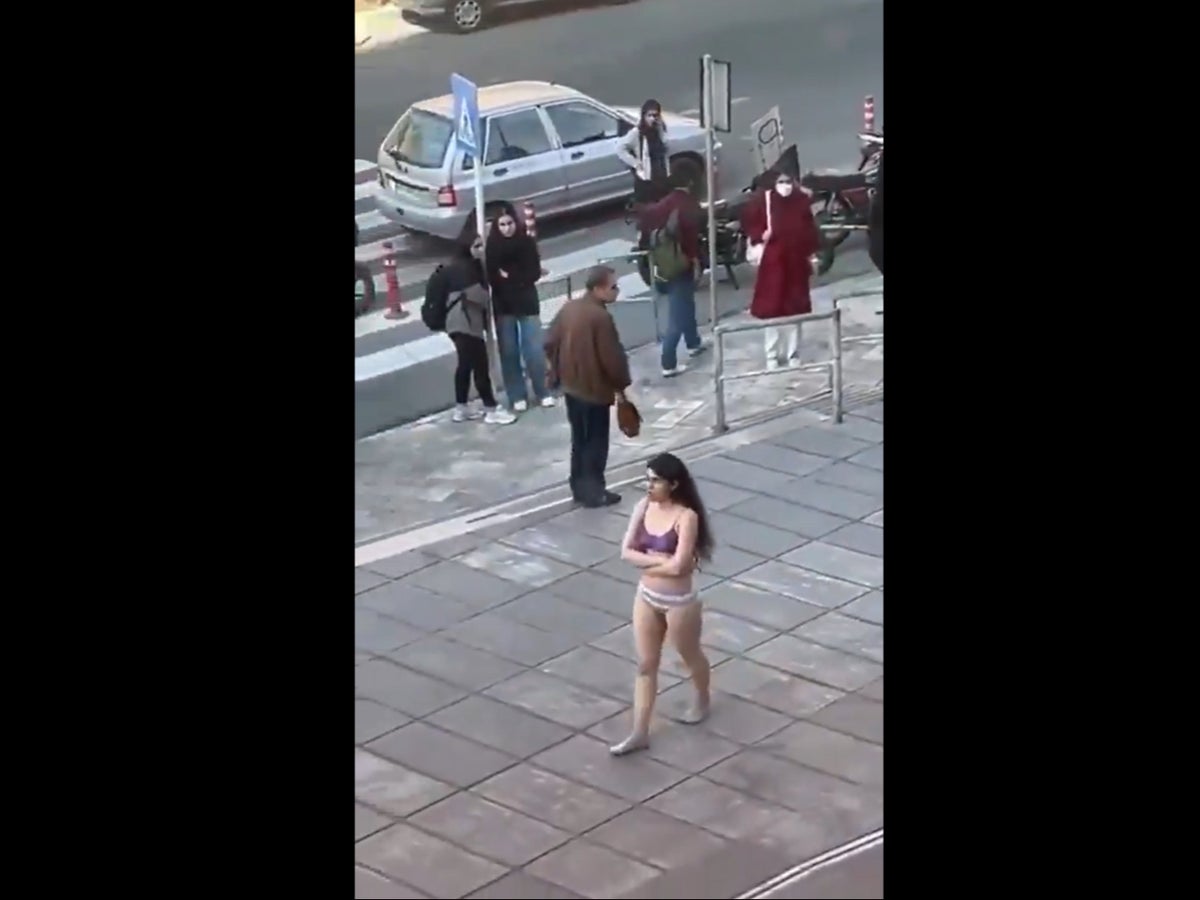A UN special rapporteur warned Iran that she is monitoring the case of a woman who was arrested after stripping down to her undergarments to protest an alleged assault for not following the country’s notoriously strict hijab laws.
Human rights groups and activists called on Iranian authorities to release the woman, whose whereabouts have been unknown since her arrest over the weekend.
The incident triggered outrage among Iranian dissidents two years after thousands of women took to the streets in 2022 in protest against the brutal death of Mahsa Amini in 2022.
“I will be monitoring this incident closely, including the authorities’ response,” Mai Sato worte on X. She shared a video that showed the woman sitting and walking around the university campus in her underwear.
Another video showed her being detained by security forces and forcibly taken into a car.
Iran’s security forces reportedly assaulted the woman and tore off her clothes inside Tehran’s Islamic Azad University science and research branch on Saturday for not following hijab rules.
Local daily Hamshahri reported on its website citing an “informed source” that the woman “has severe mental problems and, after investigations, she will most likely be transferred to a mental hospital”.
Farhikhtegan, a newspaper affiliated with Azad University, claimed that she had been admitted to a mental health facility.
In a video circulated by state media, a man identified himself as the woman’s husband and claimed she was a mother of two and suffered from mental health issues.
Amir Mahjoub, director general of public relations at Islamic Azad University, said: “Following an indecent act by a student at the science and research branch of the university, campus security intervened and handed the individual over to law enforcement authorities.”
“The motives and underlying reasons for the student’s actions are currently under investigation.”
Her arrest has triggered a backlash against the Iranian regime for throttling dissent using familiar techniques previously used by authorities to clampdown on women protesters.
Jailed Nobel peace prize laureate Narges Mohammadi issued a statement from prison, describing the woman’s body as a “symbol of rebellion, anger, and resistance”, Iran International reported.
Ms Mohammadi said women pay the price for their defiance but do not bow to force as she called for the student’s release.
The hashtag ‘Science and Research Girl’ has been trending on social media, with people sharing art and statements in solidarity with the woman.
“Iranian women rebel against everything that has imprisoned them. They rebel against everything that invites them to silence,” wrote activist Hamed Esmaeilion in Arabic.
زنان ایران نسبت به هر آنچه آنها را به بند کشیده است عصیان میکنند. نسبت به هر آنچه آنها را به خاموشی دعوت میکند عصیان میکنند. راهی روشن برای آنان که در برابر بیعدالتی، تبعیض و ظلم ساکت نمینشینند.#دختر_علوم_تحقیقات#دادخواهی
تصویر از هنرمندی که نمیشناسم. pic.twitter.com/ztt2OCWvOw
— Hamed Esmaeilion (@esmaeilion) November 3, 2024
Amnesty International’s Iran unit called on the authorities to “immediately and unconditionally” release the student.
A growing number of women are defying the strict hijab laws in the country by discarding their veils since the death of Amini.
Twenty-two-year-old Amini died after being detained by the morality police for not wearing her hijab correctly. Her death became a breaking point, sparking unprecedented protests known as “Women, life, freedom”, which lasted for three months in the country.
A months-long security crackdown that followed killed more than 500 people and saw over 22,000 detained.
However, media reports indicate that nothing has changed since the protests, and scattered photos and videos have surfaced showing women and young girls being roughed up by officers.
In October 2023, Iranian teenage Armita Geravand was injured in a mysterious incident on Tehran’s metro while not wearing a headscarf. She later died in the hospital after falling into a coma.


Leave a Comment